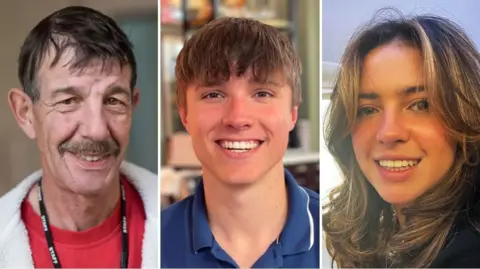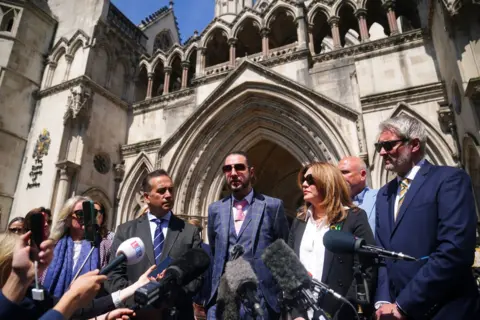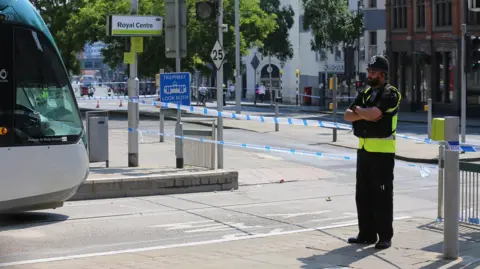 Family handout
Family handoutA review has found “a series of errors, omissions and misjudgements” in the care of a killer who stabbed three people to death in the Nottingham attacks.
Barnaby Webber and Grace O’Malley-Kumar, both 19, and 65-year-old Ian Coates were killed by Valdo Calocane, who was psychotic and suffering from paranoid delusions, on 13 June 2023.
The review, published by the Care Quality Commission (CQC) on Tuesday, said without action, the issues identified would “continue to pose an inherent risk to… public safety”.
The government met the victims’ families last week and called for the CQC’s recommendations to be implemented in mental healthcare across England.
The families confirmed the meeting with the Department of Health and the Attorney General’s Office, which both told the BBC that the prime minister’s commitment to a judge-led inquiry into the deaths still stood.
However, the families have insisted the inquiry must be statutory, with the power to compel witnesses to provide evidence.
In an interview with The Sun, Mr Webber’s mother Emma called for a complete restructure of mental health services to prevent attacks similar to the one by Calocane.
She said: “It wouldn’t have taken much looking back in the case files to see he was seriously mentally ill and violent. This attack was always going to happen — it was just a case of when, not if.”
She added: “The priority has to be public safety. We can’t have people scared to put their children into holiday clubs, we can’t have parents scared to send their children to university or put them on a bus to go to school.
“What’s more important than ensuring that level of safety for the public? We have a right to life.”
 Nottinghamshire Police
Nottinghamshire PoliceLast year, Calocane went on a rampage through the streets of Nottingham, killing students Mr Webber and Ms O’Malley-Kumar with a knife as they returned from a night out, before stabbing Mr Coates to death near the school where he worked as a caretaker.
He then stole Mr Coates’s van and drove into pedestrians Wayne Birkett, Marcin Gawronski and Sharon Miller, inflicting serious injuries.
He was sentenced to a hospital order in January and told he would be in a high-security facility “very probably” for the rest of his life.
Tuesday’s report looked into Calocane’s care by Nottinghamshire Healthcare NHS Foundation Trust from May 2020 to September 2022.
The victims’ families – who have repeatedly called for a public inquiry into the case – said they were “failed by multiple organisations pre and post” the killings.
In a joint statement, they added: “This report demonstrates gross, systemic failures in the mental health trust in their dealings with Calocane – from beginning to end.
“Sadly, this is the first of what we expect to be a series of damning reports concerning failures by public bodies in the lead-up to the killings of our loved ones, and beyond.
“Progress is slowly being made and we will continue in our fight to ensure there is full organisational and individual accountability.”
 PA Media
PA MediaDr Sanjoy Kumar, Ms O’Malley-Kumar’s father, told the BBC that the families would like the scope of the inquiry to be “as wide as possible”.
“We would like it to be a statutory public inquiry led by a judge, and one that has real teeth to make a difference and change things in our country,” he added.
“We have to concentrate on Nottingham first and learn from what went wrong because these systems are parallel across the country.”
In compiling its report, the CQC reviewed Calocane’s records alongside 10 other cases “to enable benchmarking”.
The CQC said it had “engaged” with the families of Calocane and the victims, but the watchdog did not interview or speak to any staff members involved in the offender’s care at the trust.
The report found the 32-year-old – a former University of Nottingham student – had first come into contact with the trust in May 2020 during the first Covid-19 lockdown.
Documents showed he was “acutely unwell”, and was diagnosed with paranoid schizophrenia and sectioned four times in less than two years.
But the report said “key” risks had either been missed or omitted, including the refusal of medicine, ongoing and persistent symptoms of psychosis, levels of violence against others when his psychosis was not managed well, and Calocane’s escalation of violence towards others in the later stages of his care under the trust.
It also found “poor planning and engagement” with the killer and his family, who raised concerns about his mental state with the trust and to BBC Panorama in their first interview.
“It is clear that after four admissions in two years, and repeated disengagement and refusal to take medicine, [Calocane] required a much more robust package of care,” the report said.
“More assertive engagement and restrictive measures were crucial to managing his illness and the risk he posed to others when unwell.”
The CQC issued five recommendations to the trust, including ensuring that staff were aware of the importance of involving and engaging patients’ families, and implementing “robust discharge policy and processes”.
 PA Media
PA MediaResponding to the CQC review, Health Secretary Wes Streeting said: “I want to assure myself and the country that the failures identified in Nottinghamshire are not being repeated elsewhere.
“I expect the findings and recommendations in this report to be considered and applied throughout the country so that other families do not experience the unimaginable pain that Barnaby, Grace and Ian’s family are living with.”
In its report, the CQC said NHS England would be carrying out “more detailed scrutiny” of Calocane’s wider interaction with mental health services in its “independent homicide review”.
The government said measures the NHS had already taken included issuing guidance to trusts – reiterating instructions not to discharge patients with serious mental health issues if they did not attend appointments – and ensuring every service provider had “clear policies and practice in place to treat patients”.
Chris Dzikiti, interim chief inspector of healthcare at the CQC, added: “The issues we have identified at Nottinghamshire Healthcare NHS Foundation Trust are not unique.
“We found systemic issues with community mental health care, including a shortage of mental health staff, a lack of integration between mental health services and other healthcare… and support services, including the police.
“Without action, this will continue to pose an inherent risk to patient and public safety.”

Timeline of Valdo Calocane’s contact with the trust
The CQC has released a timeline of Calocane’s contact with the local NHS trust. It said:
- 24 May 2020 – Calocane is arrested for the first time. He is sent home after a mental health assessment but is re-arrested an hour later
- 25 May 2020 – Officials section Calocane for the first time at Highbury Hospital in Nottingham
- 14 July 2020 – Calocane is involved in a police incident and sectioned for the second time
- 3 September 2021 – Calocane is sectioned for the third time and taken to an independent hospital
- 18 January 2022 – Calocane is detained after an assault on another student
- 28 January 2022 – He is sectioned for the fourth time
- 23 September 2022 – Calocane is discharged to a GP due to non-engagement

Mr Dzikiti added “poor decision-making, omissions and errors of judgement” had contributed to a situation in which a patient with “very serious mental health issues did not receive the support and follow-up he needed”.
“While it is not possible to say that the devastating events of 13 June 2023 would not have taken place had Valdo Calocane received that support, what is clear is that the risk he presented to the public was not managed well and that opportunities to mitigate that risk were missed,” he said.
“There is action that can, and must, be taken to better support people with serious mental health issues and provide better protection for the public in the future.”


Ifti Majid, chief executive of the NHS trust, offered his “sincere apologies” to the families of the victims.
“We acknowledge and accept the conclusions of this report and have significantly improved processes and standards since the review was carried out,” he said.
“Our teams have much more contact with people waiting to be seen in the community to agree crisis plans and ensure they have an up-to-date risk assessment even when they are struggling to engage with our services or primary care.
“We have a clear plan to address the issues highlighted and are doing everything in our power to understand where we missed opportunities and learn from them.”
The report is the latest of a series of reviews, including by the Independent Office for Police Conduct (IOPC) into both Leicestershire and Nottinghamshire Police.
A review into the Crown Prosecution Service (CPS) found that while prosecutors had been right to accept Calocane’s pleas of manslaughter on the basis of diminished responsibility, they could have handled the case better.
And in May, a judge ruled Calocane’s sentence was not unduly lenient, following a referral from the attorney general.

Analysis
By Navtej Johal, BBC Panorama
There are several points mentioned in this review which support the view of Calocane’s family that opportunities to provide him with the care he needed before the tragic events in Nottingham in 2023 were missed.
In their first interview, Elias and Celeste, Calocane’s brother and mother, told me that they believed the mental health system was “broken” and “not fit for purpose”.
One of many examples of the problems in his care highlighted by the CQC is the decision to discharge him to his GP for not engaging with mental health services nine months before the killings.
The review says that decision “did not adequately consider or mitigate the risks of relapse”.
Celeste Calocane said she felt that at that moment, the community mental health team “wash their hands and say, ‘OK, that’s it’.”
They will be hoping that the recommendation to strengthen policy and processes that “consider the circumstances surrounding discharge and whether discharge is appropriate” are among many that are acted upon.
Follow BBC Nottingham on Facebook, on X, or on Instagram. Send your story ideas to [email protected] or via WhatsApp on 0808 100 2210.

